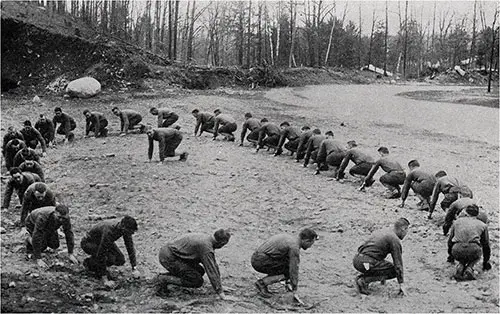History of the First Infantry Company - 3rd OTC - 1918

The Herbert Exhaustion Exercise with Cadets from the 3rd Officers Training Camp at Camp Devens Participating. GGA Image ID # 13ab6b2bca
John D. Little, a cadet of the First Infantry Company, 3rd OTC at Camp Devens, writes anecdotally of his experiences during the training, including the accuracy (or not) on the firing range, measles quarantine, and other exciting adventures during officer training.
THE PICK
THE FIRST
THIS is a sort of history or something. Of the First Company. An easy thing to write when you're on the outside looking in, but hard when you're on the inside being it, and so far as this humble historian has been able to make out a candidate in the First Company is bound to be of the opinion that he is the perpetual defendant in the military game of "Tag, You're It."
It is a strangely solemn thought that not only have there been other former Officers' Training Camps but there are at this present time of agony other companies than the First, for 'twould so consoling to think that we of the First were the only ones suffering the excruciationg mental indigestion and physical delirium of the candidate.
Long distance flashes and occasional close-ups of the other companies and the Battery would seem to indicate that they too suffer, and at times at the canteen over a convivial ice cream cone a candidate from another company has bared his soul's torment, but as a rule the First Company has been too much torn up over itself to take much stock in others' woes.
The first thing we learned was humility Some men are born so, but we were made so. If a man thought he was right and wasn't and if, as was generally the case, an instructor was also aware of these two facts, the man got an emphatic lesson in humilit from a figuratively hob-nailed voice. Perhaps the first lesson took place when the order for removing chevrons came through on the second day of the camp.
The author with his own jack-knife broke three sergeant-majors and a sort of divisional bugler that day. It is remarkable how much longer it takes to remove that kind of chevron than it does to rip off a first class private's insignia.
Taking into consideration all this inculcation of humility it was more or less of a shock to us when the First Company hove to the front in many instances. On the range the company came through with a final average of 256.17 out of a possible 375, as against the next company, which scored 250.16.
Abbott was our high man with a score of 328, Day and Swett following closely. At this point, considering that publication will be at the end of the school, it is only fair to state that a well known gentleman in the umpty-umpth squad of the First wishes to make public the fact that he owes his own particular middling average high score on the range to the fact that he always closed both eyes before shooting. We have until now kept this fact a secret, knowing that if the other companies suspected us of such talent they would seek to debar us as professionals.
A major, name withheld for militaristic reasons, said publicly that the First Company marched better than any of the other companies. Needless to say we were not going to Hebert, but to mess at the time of observation. A civilian observer was overheard to remark at retreat one afternoon that there were more red-headed persons in the First Company than in any organization which had ever obscured his vision.
Throwing all jokes aside, our great claim to social prominence lies in our tenacity in outwitting the measle germ. One by one the other companies and the battery fell by the wayside, and not until Feb. 8th, when Dan. Casey, the pride of the Haverhill Chamber of Commerce, succumbed did the First Company take the count and go into quarantine.
Even our incarceration, however, was mitigated by the entertaining talents of Hennessey, Donovan and other sweet singers and rough talkers, and by the grace of Capt. Milliken we emerged in time for the Washington's Birthday breathing spell.
On the surface we have been flippant; at drill we have laughed at solemn things; but as the school draws near its close we realize more fully what it really means, what an officer's job is, and that much sought for thing, a company spirit becomes more and more a reality which will endure after the men have departed from the company and the school to work earnestly and faithfully at whatever duties the good of the service may assign them.
JOHN D. LITTLE.
